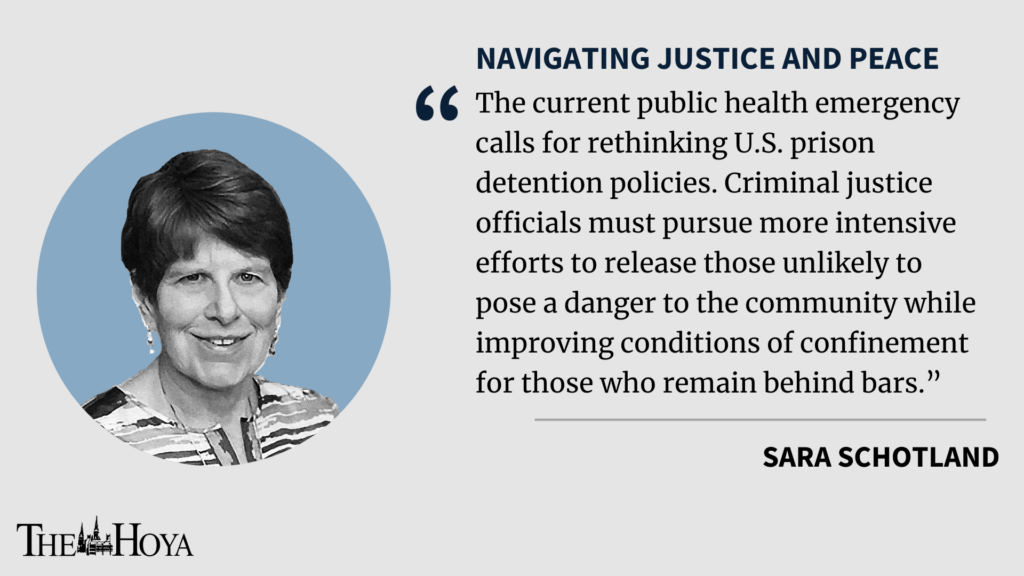Today’s prisons are breeding grounds for COVID-19. There are many reasons: crowded dormitories; shared lavatories; limited sanitation, medical and isolation resources; daily entry and exit of inmates and staff; and transfer of inmates by vans and planes. As of Nov. 1, the Federal Bureau of Prisons reported that over 30% of the federal prisoners tested to date have returned positive results.
The current public health emergency calls for rethinking U.S. prison detention policies. Criminal justice officials must pursue more intensive efforts to release those unlikely to pose a danger to the community while improving conditions of confinement for those who remain behind bars. The goals of criminal punishment — deterrence, incapacitation, rehabilitation and retribution — are not served by exposing prisoners to a serious, potentially fatal disease.
Current conditions raise serious ethical concerns. Under human rights doctrine, prisoners must be detained without abuse or torture and provided with sufficient food, shelter and adequate medical care. COVID-19 risks fall disproportionately on people of color, both because they are imprisoned at greater rates than white Americans and because the higher prevalence of preexisting medical conditions renders Black and Hispanic populations particularly vulnerable to the virus.
The First Step Act of 2018 authorizes courts to release federal inmates who are terminally ill or elderly. A “catchall provision” allows courts to order release based on a finding that “extraordinary and compelling reasons” for release exist and that a prisoner “is not likely to present a danger to the community.” However, these compassionate release provisions were not designed with COVID-19 in mind and require individual, case-by-case litigation of each prisoner’s medical condition and eligibility. Prison officials and courts have been reluctant to grant compassionate release even for inmates convicted of nonviolent crimes. Recently, the Virginia prison system declined to release a prisoner who suffered from lung and liver cancer, diabetes and hepatitis C with only months to live. The 67-year-old inmate, who had been convicted of a nonviolent crime, died in prison. Prisoners who have committed crimes of violence, even if decades earlier, are almost always barred from compassionate release.
I offer some recommendations to improve prison conditions.
Compassionate release should be significantly expanded by prison officials, courts and legislators. Prisons should identify inmates whose medical conditions render them vulnerable to COVID-19 and assess whether they can be safely released, based on review of their disciplinary records and availability of family or other responsible shelters. Inmates convicted of a crime of violence should have the opportunity to rebut a presumption that they represent a present danger based on time served, age and evidence of rehabilitation.
Containing COVID-19 in correctional facilities is difficult for three main reasons: overcrowding that precludes safe social distancing, limited sanitation and medical resources, and transfer of prisoners and staff in and out of the prisons. In response to the pandemic, local jails have significantly reduced populations by avoiding arrests for minor offenses and releasing people detained pretrial or those convicted of minor misdemeanors. However, state and federal prison systems have made only modest reductions in their populations since the pandemic began. Only 5.7% of federal prisoners are serving time for crimes of violence. Yet national prison populations have declined only slightly, with a combined drop of just 8% between state and federal facilities. Prison officials could significantly reduce the number of prison inmates by expediting parole, releasing prisoners near the end of their term to home confinement and releasing people who have committed technical, not otherwise criminal violations of probation.
As to those who remain incarcerated, prisons should follow the U.S. Centers for Disease Control and Prevention’s guidance on managing COVID-19 in prisons. While, to date, there have been improvements with respect to sanitation supplies and mask availability, facility-specific compliance is spotty, intermittent and insufficiently monitored by BOP or state authorities. Private prisons are especially unreliable when it comes to enforcing COVID precautions.
Finally, federal policymakers should take up legislative reform. Sens. Brian Schatz (D-Hawaii) and Dick Durbin (D-Ill.) have introduced the Emergency GRACE Act, which would direct the BOP to identify those federal inmates who are at a higher risk during a public health emergency and authorize pro bono counsel — essentially free legal representation from volunteer or state-funded lawyers. Those who are released would be able to access Medicaid shortly after their release. For those who remain incarcerated, all BOP facilities would be required to implement robust and ongoing testing, provide adequate personal protective equipment, soap and disinfectants free of charge, thoroughly sanitize facilities, and offer responsive medical care. Georgetown University students, like other citizens, should support initiatives to bring our prisons more in line with international human rights standards — initiatives that will hopefully gain traction under the Biden administration.
Sara Schotland is a professor in the Justice and Peace Studies Program. Navigating Justice and Peace appears online every other Friday.









